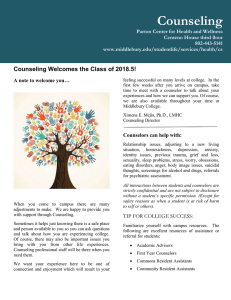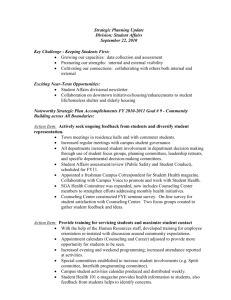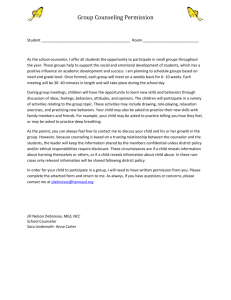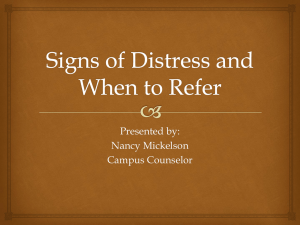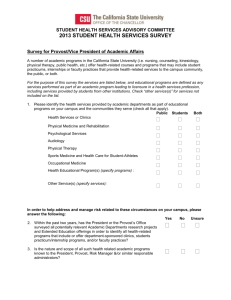Counseling Welcomes Class of 2019.5 (4)
advertisement
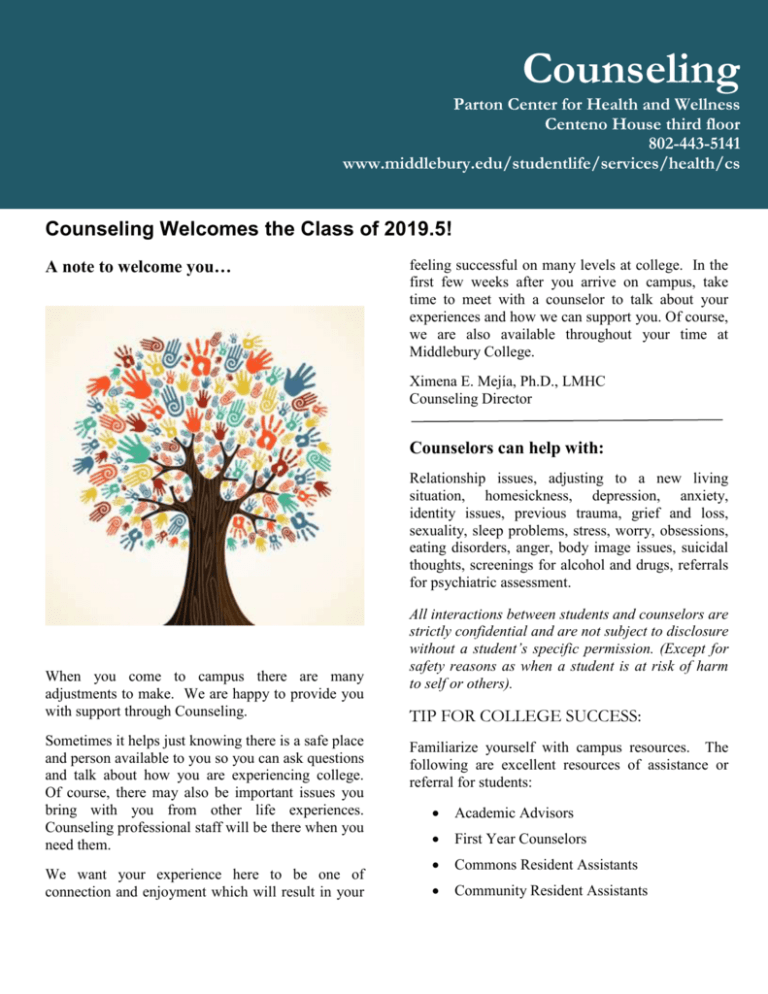
Counseling Parton Center for Health and Wellness Centeno House third floor 802-443-5141 www.middlebury.edu/studentlife/services/health/cs Counseling Welcomes the Class of 2019.5! A note to welcome you… feeling successful on many levels at college. In the first few weeks after you arrive on campus, take time to meet with a counselor to talk about your experiences and how we can support you. Of course, we are also available throughout your time at Middlebury College. Ximena E. Mejía, Ph.D., LMHC Counseling Director Counselors can help with: Relationship issues, adjusting to a new living situation, homesickness, depression, anxiety, identity issues, previous trauma, grief and loss, sexuality, sleep problems, stress, worry, obsessions, eating disorders, anger, body image issues, suicidal thoughts, screenings for alcohol and drugs, referrals for psychiatric assessment. When you come to campus there are many adjustments to make. We are happy to provide you with support through Counseling. Sometimes it helps just knowing there is a safe place and person available to you so you can ask questions and talk about how you are experiencing college. Of course, there may also be important issues you bring with you from other life experiences. Counseling professional staff will be there when you need them. We want your experience here to be one of connection and enjoyment which will result in your All interactions between students and counselors are strictly confidential and are not subject to disclosure without a student’s specific permission. (Except for safety reasons as when a student is at risk of harm to self or others). TIP FOR COLLEGE SUCCESS: Familiarize yourself with campus resources. The following are excellent resources of assistance or referral for students: Academic Advisors First Year Counselors Commons Resident Assistants Community Resident Assistants Commons Residential Advisor Parton Center for Health and Wellness Commons Coordinator Education in Action – Career Services Commons Dean Center for Teaching Learning & Research Chaplain’s Office Financial Aid Student Accessibility Services Guidelines for Students with Mental Health History These guidelines are offered to help students who either have had a past mental health concern or who currently are dealing with mental health challenges while preparing for the transition to college: Start planning early for a healthy transition to college. Prevention works. The State of Vermont is experiencing a mental health provider crisis, which means that the resources for psychiatric support are limited, unlike larger states or urban areas. Meet with your current psychiatrist, medical doctor, and/or mental health professional to review medications and discuss anticipated stresses related to the transition to college life and leaving home. Develop relapse prevention strategies. Plan follow-up appointments during breaks from college. We encourage students to continue working with their current psychiatrist, physician, or a mental health provider at home for continuity of care and for immediate access to support. If you are a local resident, consider continuing to meet periodically with your current mental health professional at least until you have adjusted to campus life. Take your medication as prescribed. Do not self-medicate using alcohol, other drugs, or food. Develop a stress management plan, and get adequate sleep. Increased stress and lack of sleep often are factors in the recurrence or enhancement of a mental health concern. Have a plan to follow if symptoms of your condition begin to recur or intensify. Respond quickly rather than putting off action. This can help you feel better more quickly and minimize the possible negative impact of a relapse on academic and social activities. Contact Counseling at 802-443-5141 (or extension 5141 if you are on campus) and make an appointment with a counselor who will assist you in developing your action plan. The counselor will provide you with short-term counseling and crisis management and help you connect with other campus and community resources. If you need ongoing specialized treatment while at college, we encourage you to call us for referrals in advance. The closest specialized treatment might only be available in Burlington you may need to arrange transportation. Counseling… Sometimes it’s just about knowing you are not alone Created 2013 based on AUCCCD samples
